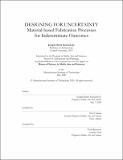| dc.contributor.advisor | Neri Oxman. | en_US |
| dc.contributor.author | Kennedy , Joseph Henry,Jr. | en_US |
| dc.contributor.other | Program in Media Arts and Sciences (Massachusetts Institute of Technology) | en_US |
| dc.date.accessioned | 2020-09-15T22:00:42Z | |
| dc.date.available | 2020-09-15T22:00:42Z | |
| dc.date.copyright | 2020 | en_US |
| dc.date.issued | 2020 | en_US |
| dc.identifier.uri | https://hdl.handle.net/1721.1/127495 | |
| dc.description | Thesis: S.M., Massachusetts Institute of Technology, School of Architecture and Planning, Program in Media Arts and Sciences, May, 2020 | en_US |
| dc.description | Pages 175 and 176 blank. Cataloged from the official PDF of thesis. | en_US |
| dc.description | Includes bibliographical references (pages 109-116). | en_US |
| dc.description.abstract | Recent advances in digital fabrication tools have enabled designers to create physical objects and structures with greater degrees of precision and efficiency. These forms of contemporary manufacturing prioritize consistency in order to create identical products whose form and behavior are easily predictable. As a result, the modern expectation for reliable uniformity at the end of a production cycle has led both creators and consumers to place value in maintaining a high standard of perfection. Rather than constraining external factors that contribute to behavioral uncertainty, manufacturing tolerances can be expanded to benefit both the design and function of products made from organic materials. Although unstable material properties may traditionally be considered weaknesses, it is possible to utilize aesthetic imperfection and operational temporality in a performative manner. With the adoption of environmentally reactive biodegradable materials, designers must accept higher levels of unpredictability to accommodate the unknown. This thesis considers methods to leverage high precision robotic fabrication to functionalize unpredictable material behavior by generating tools and workflows that can accommodate variable conditions and create value out of indeterminacy.. | en_US |
| dc.description.statementofresponsibility | by Joseph Henry Kennedy, Jr. | en_US |
| dc.format.extent | 176 pages | en_US |
| dc.language.iso | eng | en_US |
| dc.publisher | Massachusetts Institute of Technology | en_US |
| dc.rights | MIT theses may be protected by copyright. Please reuse MIT thesis content according to the MIT Libraries Permissions Policy, which is available through the URL provided. | en_US |
| dc.rights.uri | http://dspace.mit.edu/handle/1721.1/7582 | en_US |
| dc.subject | Program in Media Arts and Sciences | en_US |
| dc.title | Designing for uncertainty : material-based fabrication processes for indeterminate outcomes | en_US |
| dc.type | Thesis | en_US |
| dc.description.degree | S.M. | en_US |
| dc.contributor.department | Program in Media Arts and Sciences (Massachusetts Institute of Technology) | en_US |
| dc.identifier.oclc | 1193025154 | en_US |
| dc.description.collection | S.M. Massachusetts Institute of Technology, School of Architecture and Planning, Program in Media Arts and Sciences | en_US |
| dspace.imported | 2020-09-15T22:00:41Z | en_US |
| mit.thesis.degree | Master | en_US |
| mit.thesis.department | Media | en_US |
